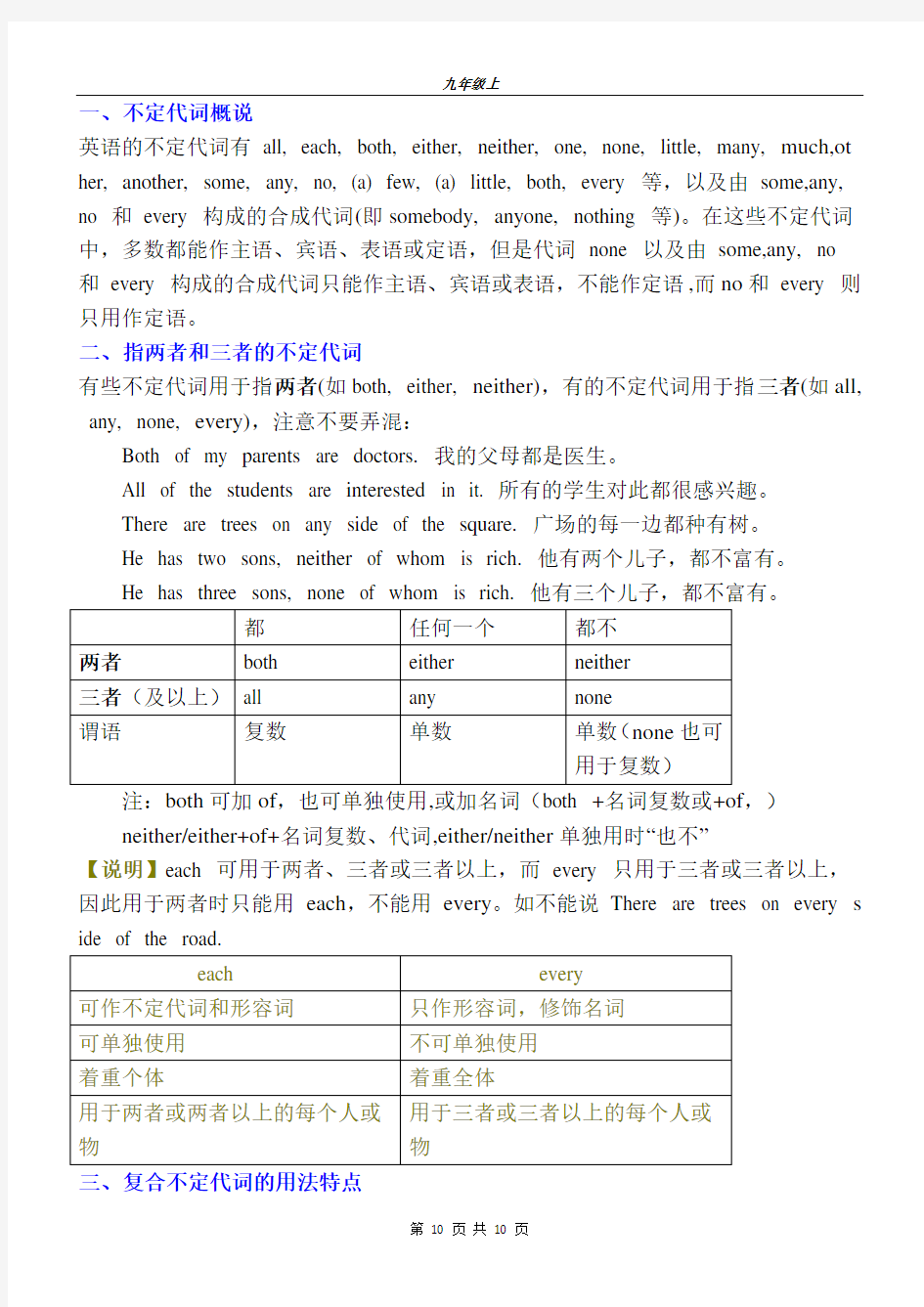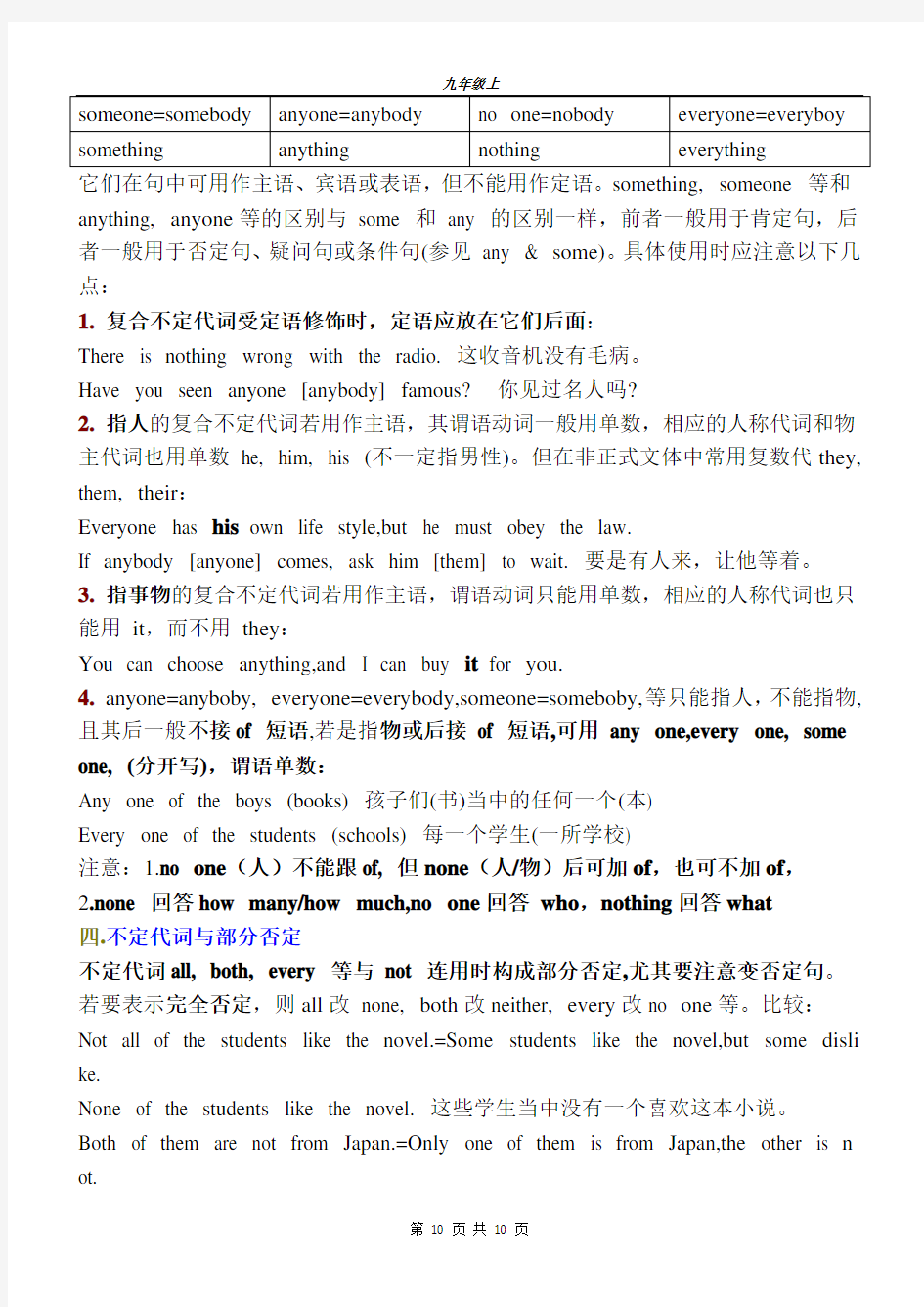不定代词专项练习解析


一、不定代词概说
英语的不定代词有all, each, both, either, neither, one, none, little, many, much,ot her, another, some, any, no, (a) few, (a) little, both, every 等,以及由some,any, no 和every 构成的合成代词(即somebody, anyone, nothing 等)。在这些不定代词中,多数都能作主语、宾语、表语或定语,但是代词none 以及由some,any, no 和every 构成的合成代词只能作主语、宾语或表语,不能作定语,而no和every 则只用作定语。
二、指两者和三者的不定代词
有些不定代词用于指两者(如both, either, neither),有的不定代词用于指三者(如all, any, none, every),注意不要弄混:
Both of my parents are doctors. 我的父母都是医生。
All of the students are interested in it. 所有的学生对此都很感兴趣。
There are trees on any side of the square. 广场的每一边都种有树。
He has two sons, neither of whom is rich. 他有两个儿子,都不富有。
He has three sons, none of whom is rich. 他有三个儿子,都不富有。
注:both可加of,也可单独使用,或加名词(both +名词复数或+of,)
neither/either+of+名词复数、代词,either/neither单独用时“也不”
【说明】each 可用于两者、三者或三者以上,而every 只用于三者或三者以上,
因此用于两者时只能用each,不能用every。如不能说There are trees
on every s
ide of the road.
三、复合不定代词的用法特点
它们在句中可用作主语、宾语或表语,但不能用作定语。something, someone 等和anything, anyone等的区别与some 和any 的区别一样,前者一般用于肯定句,后者一般用于否定句、疑问句或条件句(参见any & some)。具体使用时应注意以下几点:
1.复合不定代词受定语修饰时,定语应放在它们后面:
There is nothing wrong with the radio. 这收音机没有毛病。
Have you seen anyone [anybody] famous? 你见过名人吗?
2.指人的复合不定代词若用作主语,其谓语动词一般用单数,相应的人称代词和物主代词也用单数he, him, his (不一定指男性)。但在非正式文体中常用复数代they, them, their:
Everyone has his own life style,but he must obey the law.
If anybody [anyone] comes, ask him [them] to wait. 要是有人来,让他等着。3.指事物的复合不定代词若用作主语,谓语动词只能用单数,相应的人称代词也只能用it,而不用they:
You can choose anything,and I can buy it for you.
4.anyone=anyboby, everyone=everybody,someone=someboby,等只能指人,不能指物,且其后一般不接of 短语,若是指物或后接of 短语,可用any one,every one, some one, (分开写),谓语单数:
Any one of the boys (books) 孩子们(书)当中的任何一个(本)
Every one of the students (schools) 每一个学生(一所学校)
注意:1.no one(人)不能跟of, 但none(人/物)后可加of,也可不加of,
2.none 回答how many/how much,no one回答who,nothing回答what
四.不定代词与部分否定
不定代词all, both, every 等与not 连用时构成部分否定,尤其要注意变否定句。若要表示完全否定,则all改none, both改neither, every改no one等。比较:Not all of the students like the novel.=Some students like the novel,but some disli ke.
None of the students like the novel. 这些学生当中没有一个喜欢这本小说。
Both of them are not from Japan.=Only one of them is from Japan,the other is n ot.
五、all, both, each 等用作同位语
若用作主语同位语,主语可以是名词或代词;若用作宾语等其他成分的同位语,则宾语等成分必须是人称代词,而不能是名词:
We have all read it. 我们都读过他。(all 修饰的主语是代词)
They told us all to wait there. 他叫我们都在那儿等。(all 修饰的宾语是代词) 六、so little 与such (a) little的区别
用so little还是such little取决于little的意思:若表示数量方面的“少”,则用so lit tle;若表示形状体积的“小”,则用such little:
He has so little time for reading. 他读书的时间少得可怜。
I’ve never se en such little boxes. 我从未见过那样小的盒子。
七、some 与any的用法区别
一般说来,some 用于肯定句中,any 用于否定句,疑问句和条件句中。但是,在表示请求、邀请或征求意见的句子中,通常要用some 而不用any:
Would you like some cake? 吃点蛋糕吗?
Why not buy some bread? 为什么不买些面包呢?
Shall I get some chalk for you? 要我帮你拿些粉笔来吗?
【说明】any 有时也用于肯定句中,此时表示“任何”:
Any colour will do. 任何颜色都行。
Come any day you like. 随便哪天来都可以。
八.many 与much的用法区别
两者都表示“许多”,但many 修饰或代替可数名词(复数),而much 用来修饰或代替不可数名词(单数);但是many,much 常用于疑问句和否定句中现在也可用于肯定句,a lot of =lots of用于肯定句中,
Did you see many people there? 你在那儿看见许多人了吗?
We don’t have much time. 我们没有许多时间。
九.few, a few 与little, a little的用法区别
注意:little有“小的”意思,修饰可数名词eg:a little boy
十.other,the other,others,the others,another的区别
不定代词专项练习
I. 用some、any填空。
1. The re isn’t _______ water in the bottle.
2. Do you have _______ English books? No, I don’t have _______.
3. There are _______ people in the room.
4. Could you give me ________ paper, please?
5. If you have_______questions, I can give you_____help.
6. I will come to see you _______ day.
7. Li Ming is more careful than ______ other boy in the class.
8. Would you like _______ pop, please? 9.Why not buy______apples?
II. 用little, a little, few & a few填空。
1. Don’t worry. There is ________ time left.
2. He did very well in the exam. So he made _______ mistakes.
3. Do you have any friends in the USA? Yes, I have ________.
4. He can’t understand my English words, becau se he knows __________ English.
5. Very ________ of us can speak French.
6. -Could I have some water, please? -Sorry, I have _______ now.
7. He has made quite ________ friends in China.
8. Would you like some rice? Thanks, but just ________.
9.There is a little bird in the tree, but only ______ people saw it.
10.Could I have______words with you, Miss White?
11. We don’t like him, because he does______for other people.
12. He has____friends here and he seldom goes out on weekend.
13. There is only_____water in the pot(锅).
III用all、both、every、each填空。
1. ________ of my parents work in this shoe factory.
2. Li Ming and Li Ping are _________ from China.
3. _______ of us is good at playing football.
4. _______ student should work hard at their lessons.
5. ________ of my boy classmates play football after school.
6. There are a lot of buildings on ________ side of the street.
7. Please give ________ the books to your class teacher.
8. These apples are those children’s. Please give them _______.
Iv用no one、none、nobody、nothing填空。
1. --Who is in the room? --______.
2.--How much meat is there on the plate? --______.
3. ______ of us can speak French.
4. ________ knows what they fought about.
5. --Can you see anybody in the room? --No, I can see ________.
6. --Do you know how many dictionaries they have already bought? Yes, I do. They have bought _________.
7. What did you see in the box yesterday? I saw ________.
8. –Have you all finished the homework? –No, _______has finished it yet.
V 用something, somebody; anything, anybody; nothing, nobody; everything, everybody 填空。
1. There is ________ wrong with his computer.
2. I hope ________ goes well.
3. Do you know ________ about the USA? No, I know _________ about it.
4.Since _____ is here, let’s begin our meeting.
5. I can’t say _______ about him. I am afraid of him.
6. _________ is in the room. So you can’t hear any voice.
7. ________ except Li Ping went to the park. He was ill.
